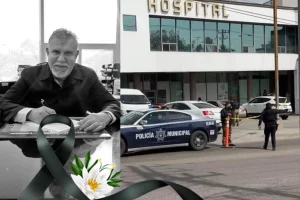CONDENA MH CLÚSTER ATAQUE ARMADO A HOSPITAL ARCÁNGELES
Leer más
Evidence on Omicron Severity ‘Could Take Weeks’

Several experts have been warning that more restrictions will be necessary to get the UK through the Omicron wave, but according to Prof Ewan Birney, director of the European Bioinformatics Institute, “such decisions are likely to be needed to be made in advance of conclusive evidence” about the severity of Omicron and its impact on the NHS.
A consensus statement from the Scientific Pandemic Influenza Group on Modelling (SPI-M) published on December 18 was clear. “There currently remains no strong evidence that Omicron infections are either more or less severe than Delta infections, it said.
According to the Group, it would take between 4 and 6 weeks for the evidence to accrue.
The current uncertainty was echoed by the Scientific Advisory Group for Emergencies (SAGE) which said on the same day that it was “still too early to reliably assess the severity of disease caused by Omicron compared to previous variants”.
The UK Health Security Agency reported on Tuesday 90,629 new cases of COVID-19, and 172 deaths within 28 days of a positive test.
Latest daily figures showed 847 hospital admissions of patients with COVID in the UK on December 17, down from 920 three days earlier. There were 7801 patients with COVID in hospital on Monday, of which 859 were on mechanical ventilation.
South Africa’s Experience
Health specialists and statisticians have looked to South Africa, where Omicron is thought to have first emerged, and which is several weeks ahead of the UK, to assess the impact of the variant.
In South Africa, hospitalisations of COVID cases rose from 575 in the week ending November 14 to a high of 8019 in the week ending December 12.
In a population of 60 million, there are 7768 people in hospital with confirmed COVID, of whom 244 are ventilated and 1257 in need of oxygen.
South Africa’s National Department of Health said there had been a further 35 COVID related deaths by Tuesday.
However, the SPI-M group cautioned that South Africa and the UK had different population demographics, and that early indications of shorter stays in hospital in South Africa might not be applicable to the UK.
According to SAGE: “Even if there were to be a modest reduction in severity [of Omicron] compared to Delta, very high numbers of infections would still lead to significant pressure on hospitals.” It estimated there were “likely to be between 1000 and 2000 hospital admissions per day in England by the end of the year”.
No Change for Christmas
Prime Minister Boris Johnson has ruled out tougher COVID-19 restrictions in England in the run-up to Christmas, but he says further measures could still be needed.
The Prime Minister’s announcement last night that the Government “will continue to monitor the data closely” reflects continuing uncertainty over how the Omicron variant of SARS-CoV-2 will play out.
His statement came as the UK Health Security Agency reported an additional 15,363 confirmed cases of Omicron on Tuesday, taking the UK total to 60,508.
The figure was lower than Monday’s daily case rate of 91,743.
In a video, Mr Johnson said: “In view of the continuing uncertainty about several things – the severity of Omicron, uncertainty about the hospitalisation rate, or the impact of the vaccine rollout or the boosters – we don’t think today that there is enough evidence to justify any tougher measures before Christmas.”
However, he added that “we can’t rule out any further measures after Christmas”.
Virologist Prof Lawrence Young from the University of Warwick, called the Prime Minister’s decision “a very risky approach” that was “very likely to result in the need for more stringent restrictions in the near future”.
Mr Johnson’s statement came as Scotland announced further measures to slow the spread of Omicron.
Tighter Rules in Scotland
The Scottish Government today announced that from December 26 attendance at large events would be limited to 100 people for indoor standing events, to 200 people for indoor seated events, and to 500 people for all outdoor events seated or standing.
Also, from December 27 there would be a requirement for 1 metre physical distancing between adults in all indoor hospitality and leisure settings.
Scotland’s First Minister, Nicola Sturgeon, said: “We know from experience that if we wait until the data tells us conclusively that we have a problem, for example, with hospital admissions, it will already be too late to act to avoid that problem.”
https://www.medscape.com/viewarticle/965354?src=soc_fb_211223_mscpedt_news_mdscp_omicron&faf=1
Créditos: Comité científico Covid




